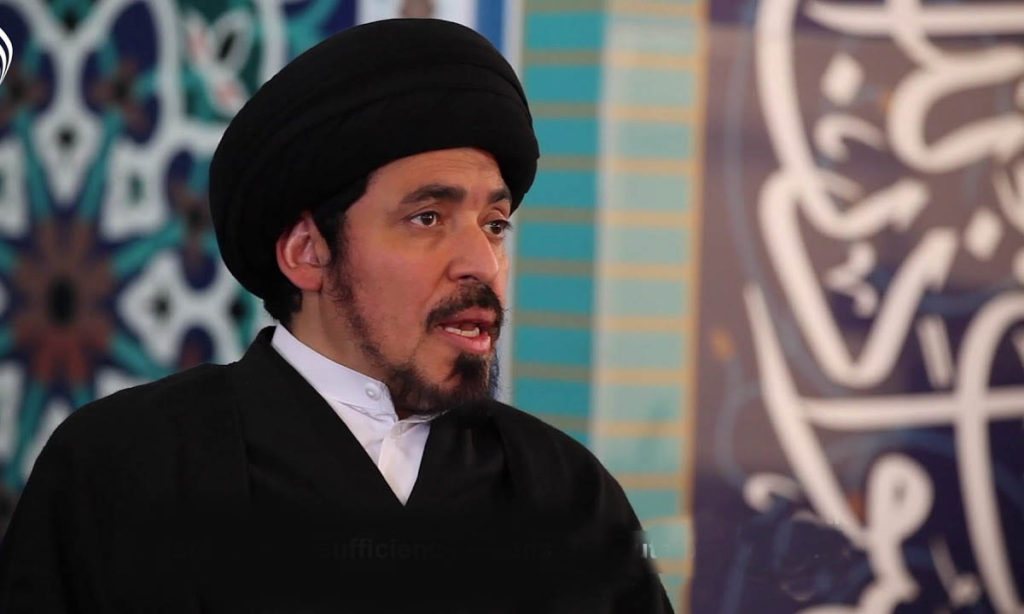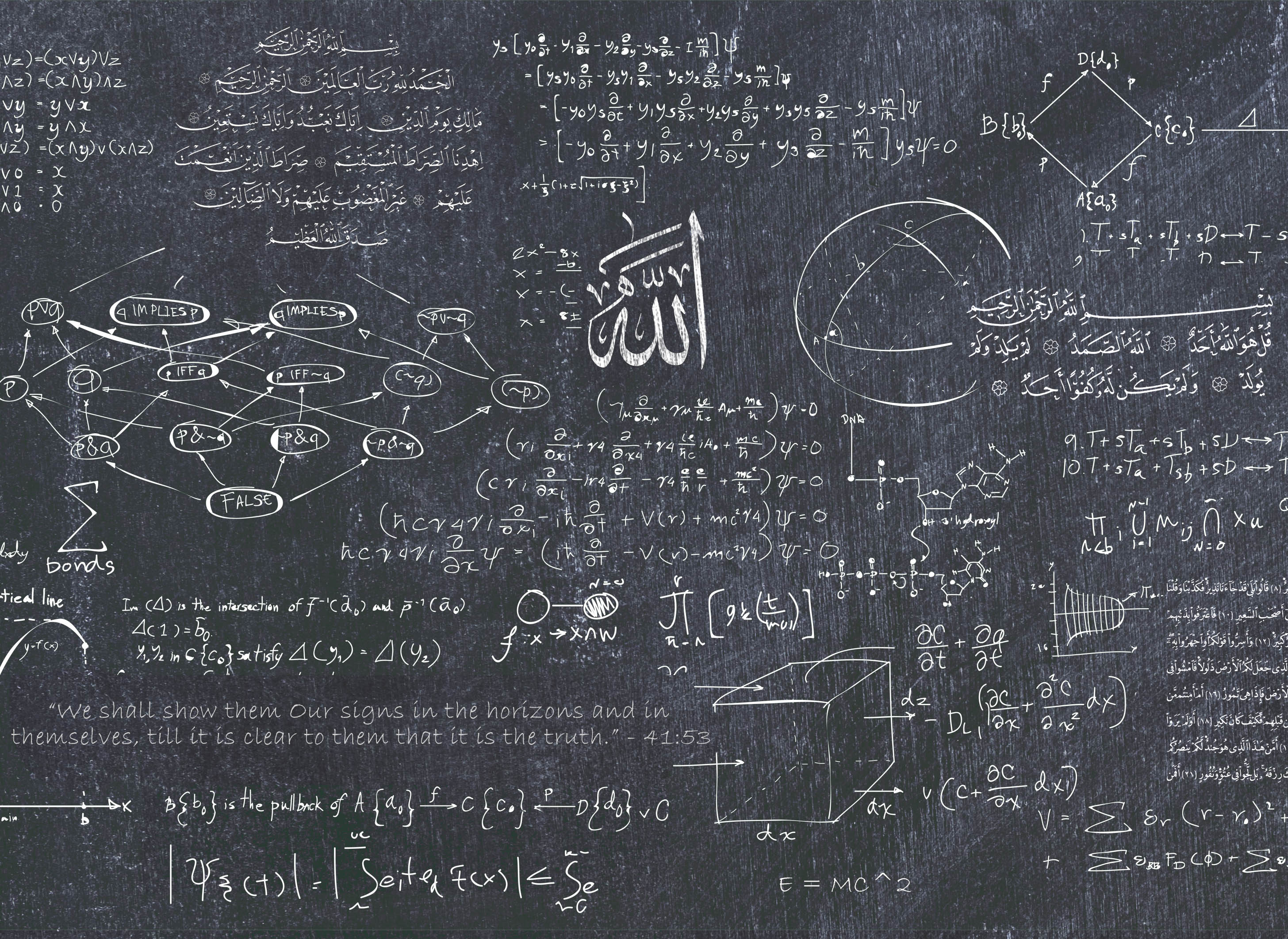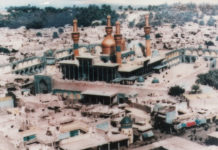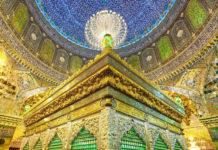What do the Qurʾan and aḥādīth teach us about knowledge and wisdom? What role does knowledge play in our religious life? And what can we learn from the lives of our ʿulamāʾ, in devoting our lives to seeking deep and critical knowledge, and striving for a life of taqwā and God-consciousness? We sat down with Sayyid Munīr al-Khabbāz to gain insights into these questions and more.
Sayyid al-Khabbāz is among the senior ʿulamāʾ and teachers of the Qumm seminary. Originally from Qatif, Saudi Arabia, Sayyid al-Khabbāz began his seminary training at the young age of 14, and has studied with some of the most eminent scholars of our time, including Sayyid Abu al-Qāsim al-Khūʾī, Sayyid Muḥammad ʿAlī al-Sīstānī, and Mīrzā Jawād al-Tabrīzī. Currently, he teaches the subjects of uṣūl al-fiqh (Islamic legal theory) and fiqh (Islamic law) at the highest level (al-baḥth al-khārij) in the Qumm seminary.
Al-Sidrah: How do our revealed religious texts define knowledge (ʿilm) and wisdom (ḥikmah)? How are the two distinct from one another?
SMK: In the discipline of logic, knowledge is traditionally defined as a concept that is present in the mind. It is divided into two types: simple apprehension (taṣawwur) and ascension (taṣdīq). Linguistically, knowledge is defined as the unveiling of reality or truth for a person. But our religious texts do not use the word “ʿilm” (knowledge) in a particular way (ḥaqīqah sharʿiyyah) that is distinct from its lexical meaning.
Some aḥādīth describe knowledge as a light that God bestows upon the hearts of whomever He wills among His servants. Others state that knowledge is better than wealth because wealth depletes as it is spent, whereas knowledge grows when it is used; or that those who collect and guard wealth are overcome and defeated even while they are still alive, whereas scholars (ʿulamāʾ) persist forever; or state that knowledge calls to action, and if it finds action [then it stays], otherwise it departs. The apparent sense of these texts appears to describe knowledge as the presence of God in the soul (nafs) of a person. When a person is able to perceive God as present in his own soul, he has attained this knowledge that the aḥādīth indicate, a knowledge that protects one from hypocrisy, that is more valuable than wealth, and that allows a person to attain the good of this world and the hereafter. This spiritual presence of God is the light (nūr) which he puts into the hearts of His servants, a reality He alludes to in the verse, “God guides whom He pleases to His light.” [1]Qurʾan, al-Nūr (24):35.
As for the term “wisdom” (ḥikmah), linguistically it refers to situating things in their proper place. If a person has this ability, he is characterized as wise (ḥakīm) because his action are coherent and “firm” (muḥkam), for he places things where they ought to be. A number of verses of the Qurʾan speak about the effects of wisdom. For example, the Qurʾan states: “Whoever is given wisdom, he has been given abundant good;”[2]Qurʾan, al-Baqarah (2):269. “God bestowed upon you the book and wisdom and gave you knowledge of that which you knew not. The grace of God upon you is of great magnitude.”[3]Qurʾan, al-Nisāʾ (4): 113. Ḥikmah is in fact juxtaposed or paralleled to the divine Book (kitāb): “It is he who sent forth to the ummīyīn, from among them, a messenger who recites to them His signs, purifies them, and teaches them the Book and wisdom.”[4]Qurʾan, al-Jumuʿah (62): 2.
Thus, wisdom refers to that totality of virtues that come as a result of the dominion of the intellect over all other faculties of the soul.
From the apparent sense of these verses—with the first verse equating wisdom with the divine Book, the second stating that wisdom is something taught and bestowed, and the final stating that whoever is bestowed with ḥikmah is bestowed with “abundant good”—we can understand wisdom to be the sum total of what it means to have righteous conduct, what we call practical wisdom (al-ḥikmah al-ʿamaliyyah). Ḥikmah refers in reality to the totality of virtues. The faculties of the soul are usually divided into three main categories: anger, lust, and intellect (al-ghaḍabiyyah, al-shahwiyyah, and al-ʿaqliyyah). Wisdom is when the soul’s intellectual faculty has dominion over the other faculties, a state in which every action that emanates from a person emanates from the balance that the intellect creates within that person’s soul. Thus, wisdom refers to the totality of virtues that result from the dominion of the intellect over all other faculties of the soul.
Al-Sidrah: What role does knowledge play in a person’s piety and spiritual growth? Is knowledge a necessary element in this growth?
SMK: There is no doubt that knowledge is necessary for a person to attain true piety. We read in the Qurʾan that, “It is only the knowledgeable (ʿulamāʾ) among God’s servants who fear Him.”[5]Qurʾan, Fāṭir (35):28. The apparent sense of this verse signifies delimitation and exclusivity, that the [singular] path towards true piety and fear of God is knowledge. A second verse states, “Is he who supplicates in the watches of the night, prostrating and standing, apprehensive of the Hereafter and expecting the mercy of his Lord [like someone who is not such]? Say: Are those who know equal to those who do not know? Only those who possess intellect take heed.”[6]Qurʾan, al-Zumar (39):9. Prostration and standing in prayer are succeeded by a reference to knowledge; in other words, these actions are fruitful only by virtue of the presence of knowledge. [The verses commands:] say that these acts of worship are only fruitful with and by the presence of knowledge, that only a knowledgeable person can benefit from this worship. Therefore, knowledge is the path to piety, to real and true fear of God, Sublime and Holy is He.

However, only knowledge that is connected to the Divine, to Allah, can fulfil this role. Other types of knowledge cannot do so, even if that knowledge is itself intrinsically valuable. Sometimes a person commits an act because it contains an intrinsic value; at other times, he acts in a utilitarian way, to receive some other benefit. Sometimes, a person seeks to use the sunlight, or he wants to utilize water from the sea, or whatever other blessing that God has bestowed. This person aims to benefit from those objects in themselves. At other times, a person may approach an object to gain something else. It is this second case that is relevant to knowledge; in other words, divine knowledge is when a person sees all the beings of this world as simply signs of God and emanations of the Divine. If he sees all these things as means to an ultimate end, then he has traversed the path of knowledge that will convey him to true piety and fear of God.
In this respect, the following hadith is narrated from Amīr al-Muʾminīn (ʿa), “I have not seen anything except while seeing God before it, after it, with it, and within it.”[7]قال امير المؤمنين: ما رأيت شيئاً إلاّ ورأيت الله قبله وبعده ومعه وفيه. It is also reported from the Imam, “Even if [all] veils were to be lifted, my level of certainty would not be increased.”[8]لَوْ كُشِفَ اَلْغِطَاءُ مَا اِزْدَدْتُ يَقِيناً. Muḥammad Bāqir al-Majlisī, Biḥār al-Anwār, vol. 40, p. 153. This type of sacred ʿAlawī soul does not see any being except as a means, as a manifestation of God and a mirror reflecting God. He is, in effect, an instance of the verse, “We will show them our signs in the horizons and in their own selves such that it becomes manifest that it is the truth. Does it suffice not that your Lord is witness over all things?”[9]Qurʾan, Fuṣṣilat (41):53.
Al-Sidrah: Whenever we hear the phrase “religious sciences” we often think of fiqh and tafsīr. How do we differentiate between religious and non-religious sciences? What is the criteria for this distinction?
SMK: A report is transmitted from Imām al-Ṣādiq (ʿa) in which he says, “Teach your children from our knowledge what will avail them.” What is meant by “our knowledge” mentioned in this hadith? Religious knowledge, or in other words, the knowledge of the Ahl al-Bayt, is every knowledge that is relevant to the realization of God’s aims and goals on Earth. Every science or field that has a share in accomplishing this final aim is considered “religious knowledge”, because it is a means of actualizing religion and its realization on Earth. We read in the Qurʾan: “By God! We have most certainly sent our messengers with clear signs and sent down with them the book and the scale so that the people establish equity.”[10]Qurʾan, al-Ḥadīd (57):25. The entire purpose of sending messengers was to establish equity. Thus, every knowledge or science that shares in establishing equity is properly classified as “religious knowledge.” We also find in the Qurʾan: “I created not the jinn and mankind except that they worship me.”[11]Qurʾan, al-Dhāriyāt (51):56. [This verse states that] another goal of the creation of jinn and humankind is worship. All knowledge that allows for the realization of worship is properly “religious knowledge.”
Therefore, the religious sciences are not limited to fiqh, uṣūl, ḥadīth, the Qurʾanic sciences, etc. Rather, any knowledge that allows for the realization of the goals of religion is religious knowledge or science. This is what separates the religious sciences from the non-religious sciences.
Al-Sidrah: …So some human sciences or social sciences could also be considered religious science or knowledge.
SMK: Yes, even some social and natural sciences can fall under the category of religious sciences, if they are a means to the realization of those religious ends.
…any knowledge that allows for the realization of the goals of religion is religious knowledge or science.
al-Sidrah: The curriculum of the ḥawzah and that of universities is different both in the topics that they study and in the amount of time they spending acquiring the necessary competencies. What are the reasons for and benefits of the traditional ḥawzah curriculum?
SMK: The traditional curriculum of the ḥawzah is, from one perspective, beneficial and praiseworthy, but from another, open to criticism. The traditional curriculum of the ḥawzah has a special property, namely that it cultivates in the student the capacity to think and engage with issues critically but productively. The ḥawzah is based on quality, not quantity, meaning that it focuses on cultivating a person’s mind to critique and produce, to meticulously analyze information and present new theories. This is the difference between a curriculum that focuses on induction and one that focuses on reasoned argument and deduction.
This does not mean, however, that the seminary curriculum is free of any criticism. In many standardized texts of the seminary, the information that is taught may be from a previous era. For example, one of the best texts on legal theory and hermeneutics (uṣūl al-fiqh) is al-Kifāyah.[12]Kifāyat al-Uṣūl is a textbook on legal theory and hermeneutics written by al-Ākhūnd Muḥammad Kāẓim al-Khurāsānī (1839-1911). It is currently taught as a foundational textbook in the field of legal theory (uṣūl al-fiqh). This book represents a particular level of legal theory that was present at the author’s time. As for the contemporary state of the field of legal theory, a student has to struggle to learn and understand it himself. The same is true in Islamic law (fiqh) wherein the standard texts that are studied, by al-Shaykh al-Anṣārī, al-Shahīd al-Awwal, or al-Shahīd al-Thānī, reflect the state of the field during their time. This is also the case with the study of philosophy. Today’s textbooks—the Manẓūmah of al-Sabzawārī, the Asfār of al-Mullā Ṣadrā, Bidāyat al-Ḥikmah and Nihāyat al-Ḥikmah of al-ʿAllāmah al-Ṭabāṭabāʾī—reflect the state of philosophy of previous eras. Today, however, it has become necessary for the student to read and compare the philosophy that is studied in the seminary to that of the West, and to become acquainted with how later philosophers have critiqued previous thought and further developed these fields.
So the seminary’s curriculum is better in the sense that its trains its students to critique and produce, whereas the academic curriculum is beneficial because it stays abreast of current developments in various fields.
al-Sidrah: Many religions in Western society do not place the same emphasis on religious law [as Islam does.] How do we explain to our society the importance of Islamic law to a Muslim?
SMK: Fiqh is a means of assembling and constructing life. Fiqh in this sense is not just the fatāwā that are listed by jurists in their legal manuals; rather, it is composed of religious rulings and general directives to society. More importantly, fiqh is not limited to the individual, rather it also contains laws for the collective. Collective or societal fiqh looks at the general state of society and is not directed at the individual.
For example, we admit that society has many necessities, such as creating a political system. Muslims in the West, in order to bring Islam to life in this society, need to enter into the political sphere in whatever way they can, so as to ensure Muslims have a say and a presence in these Western countries. As a result, the delineation of particular methods by which Muslims can establish their status in society through engagement in the political system is among the concerns of fiqh. Thus, fiqh is not limited to the issues of personal or individual religious practice; we should not think of fiqh simply as a set of rules for the individual regarding his canonical prayers, his individual worship, or his personal transactions.
Sometimes when we read the following in religious legal manuals: “It is obligatory upon every responsible adult to be a mujtahid, follower of a mujtahid, or precautionary actor in all his actions and restraint,” it is as though we interpret fiqh as just focusing on the individual alone. Rather, we must see fiqh in an intimate way, such that it reveals itself as that complete system that is constitutive of life. This is only possible if fiqh is both societal and individual. So, when we look at the fiqh of judgeship, family, roads, etc. with this big-picture view, we are able to present fiqh as a path for structuring life [as a whole], as we see in the verse, “O you who believe! Respond to God and the Messenger when they call you to what gives you life.”[13]Qurʾan, al-Anfāl (8): 24.
Al-Sidrah: A few years ago, a question was posed to Sayyid al-Sīstānī about why today’s youth are so quick to forgo their faith and fall into religious and spiritual crises. In his response, Sayyid al-Sīstānī focused on the need to bolster a sense of pride and care for our religious identity, and to try to direct that innate human sense of pride from a young age towards religion and religious identity. Why did Sayyid al-Sīstānī focus on the issue of “religious identity” when answering this question?
SMK: The question posed to him was about a psychological issue, and that was: Why is it that when many Muslim youth face a doubt or question about their religion, they quickly fall into an existential and religious crisis and a loss of faith? What is the root psychological cause for these sudden crises and the resultant loss of faith? The question was asking what these psychological causes are. For this reason, Sayyid al-Sīstānī gave an answer from a psychological standpoint attempting to identify the latent weakness which leads to this quick defeat. He responded that it is part of human nature to have pride for one’s own identity. Sometimes it is pride in a person’s national identity—for example, when a person states [proudly], “I am from such and such country”—or his tribal affiliation—“I come from such and such a tribe,”—or even a linguistic identity—for example, “I am Arab, Persian, etc.” Every human carries within him a deep-seated sense of pride for his identity. It is this psychological element of pride in one’s identity that we must utilize to strengthen a deep sense of religious identity. Therefore, the question was not about responding or resolving these intellectual doubts and deviations, for him to respond scientifically or theoretically, or for example, for him to mention the economic problems, or even the social and sociological issues that cause this religious crisis. It was about the internal psychological issues that cause a person to so quickly lose his faith. The issue [Sayyid al-Sīstānī] identified was that the person does not consider his religion to constitute a part of his identity. Were a person to understand his religion as a part of his identity, he would take the same amount of pride and care regarding his religion as he does for his nation, his language, and so on.
al-Sidrah: We often focus on the intellectual side of the life of ʿulamāʾ—their research and detailed analyses. do you have any stories of the role of piety in the intellectual and academic upbringing of scholars?
SMK: Religious sciences are different from other scholarly fields, insofar as the goal of religious sciences is to create a scholar that is a representative of the religion, which is different from [goals of] other intellectual pursuits. The goal of those [fields] is not for the person to become a symbol or representative of a particular belief [within society]. Because this is the goal of religious knowledge—to create a scholar that represents the religion—it is therefore impossible to separate knowledge from piety, to have religious knowledge without a firm relationship with worship and acts of piety. For this reason, we see that ʿulamāʾ believe that among the established means for a scholar to become a means of reaching God, and a sign from among the signs of God, is for him to pair knowledge with piety.
It is reported that Sayyid Hādī al-Mīlānī—one of our highly-esteemed scholars and marājiʿ—said that one of the conditions of ijtihād is ṣalāt al-layl. This does not meant that it is impossible, as a matter of fact, for a person to reach the level of ijtihād if he is not a performer of tahajjud. What he intended was that ṣalāt al-layl, by its very existential reality, creates a state of sincerity and humility towards God, and allows a person to reach the blessings and graces of the knowledge of Ahl al-Bayt (ʿa). After all, the aḥādīth of the Ahl al-Bayt are not simply just scattered reports. Rather, their narrations contain symbols and secret treasures which a person will not understand without combining knowledge with piety, and truly fearing and humbling oneself towards God.
…ṣalāt al-layl, by its very existential reality, creates a state of sincerity and humility towards God, and allows a person to reach the blessings and graces of the knowledge of Ahl al-Bayt (ʿa).
This is what our ʿulamāʾ have devoted themselves to. Thus, for example, it is reported that al-Shaykh al-Anṣārī[14]al-Shaykh Murtaḍā al-Dizfūlī al-Anṣārī (1214-1281 A.H./1781-1864 C.E.) was the foremost marjiʿ of his time, completely transforming the fields of Shiʿi law and legal theory of his time. He is widely recognized as both an exemplary scholar, a pious sage, and a teacher of the greatest scholars of succeeding generations. His effect on modern Shiʿi intellectual and religious history can hardly be overemphasized. would go to the shrine of Amīr al-Muʾminīn (ʿa) and weep in view of the public for a long time. This was at a time when he was the sole marjiʿ of the Shiʿa. He was setting an example: that the reason he had reached that status—he was the sole marjiʿ of his time and continues to be a pillar of juridical thought to this very day—was because he paired and connected his knowledge with piety.
This is what we have observed of our ʿulamāʾ and marājiʿ, among them our own teacher Sayyid ʿAlī al-Sīstānī, may he prosper for a long time to come. From the beginning of the time I spent with him, even before he became a marjiʿ, we saw that he was a [truly] spiritual person. His relationship with worship was on par with his relationship with knowledge and studying. His love for worship was equal to his love for knowledge and study. It was to such an extent that some colleagues tried to dissuade us from his courses, saying things like, “This man is a dervish…preoccupied with other things, just sitting on his prayer mat with his rosary…He spends hours sitting in the mosque of Kufa and sitting in the mosque of Sahlah,” and other things of this nature. This is how they thought about him, as if he was not qualified for juridical thought.
However, he was following the guidance of Amīr al-Muʾminīn (ʿa), pairing his knowledge with action, his knowledge with asceticism, distancing himself from worldly manifestations. When speaking to his students, he would also cite the example of Shaykh al-Anṣārī, explaining that [Shaykh al-Anṣārī] was the prime example of a scholar who had combined asceticism with knowledge, and knowledge with action.
Notes
| 1. | ⇧ | Qurʾan, al-Nūr (24):35. |
| 2. | ⇧ | Qurʾan, al-Baqarah (2):269. |
| 3. | ⇧ | Qurʾan, al-Nisāʾ (4): 113. |
| 4. | ⇧ | Qurʾan, al-Jumuʿah (62): 2. |
| 5. | ⇧ | Qurʾan, Fāṭir (35):28. |
| 6. | ⇧ | Qurʾan, al-Zumar (39):9. |
| 7. | ⇧ | قال امير المؤمنين: ما رأيت شيئاً إلاّ ورأيت الله قبله وبعده ومعه وفيه. |
| 8. | ⇧ | لَوْ كُشِفَ اَلْغِطَاءُ مَا اِزْدَدْتُ يَقِيناً. Muḥammad Bāqir al-Majlisī, Biḥār al-Anwār, vol. 40, p. 153. |
| 9. | ⇧ | Qurʾan, Fuṣṣilat (41):53. |
| 10. | ⇧ | Qurʾan, al-Ḥadīd (57):25. |
| 11. | ⇧ | Qurʾan, al-Dhāriyāt (51):56. |
| 12. | ⇧ | Kifāyat al-Uṣūl is a textbook on legal theory and hermeneutics written by al-Ākhūnd Muḥammad Kāẓim al-Khurāsānī (1839-1911). It is currently taught as a foundational textbook in the field of legal theory (uṣūl al-fiqh). |
| 13. | ⇧ | Qurʾan, al-Anfāl (8): 24. |
| 14. | ⇧ | al-Shaykh Murtaḍā al-Dizfūlī al-Anṣārī (1214-1281 A.H./1781-1864 C.E.) was the foremost marjiʿ of his time, completely transforming the fields of Shiʿi law and legal theory of his time. He is widely recognized as both an exemplary scholar, a pious sage, and a teacher of the greatest scholars of succeeding generations. His effect on modern Shiʿi intellectual and religious history can hardly be overemphasized. |




